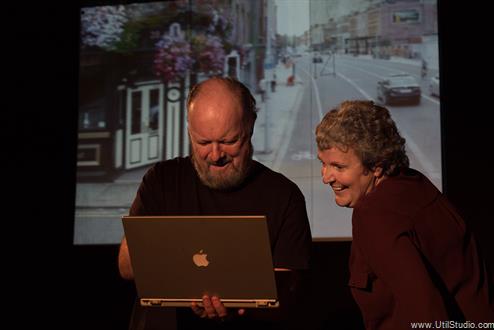WHEN Wicklow playwright and actor Rose Henderson’s father was stricken by Alzheimer’s in his latter years, it meant a lot of challenges for her family, particularly her also ageing mother.
She has mined the experience of her father’s last 15 years for the play Take Off Your Cornflakes, which she co-wrote with Fair City star Pat Nolan, and the two will also star in it at glór on February 21.
An undeniably serious and sad theme, she says the play is also quite funny, and that humour is one of the best coping strategies for coping with something so devastating. “It as a horrendous thing to hit our family, the repercussions were just exhausting. He was a great Dad, very bright, he was an engineer and his memory had been his friend really. He just didn’t get it, that he wasn’t remembering things, even sequences. He’d look at the kettle and wondering how do you turn that on, is there a switch some place, should I fill it first. And those were things that had been no problem for him.”
Of the disease, she says, “The short term memory becomes shorter and shorter, so short that the beginning of the sentence is gone before you get to the end of it. That’s so hard for us to understand when your own brain is working and someone else’s isn’t, its just really hard to understand it, but you have to, because you have to protect him and we all have to function. You get good at doing things before he gets confused or I might say ‘Hi Dad, it’s Rosie’ before he forgets your name.”
Her father found it very hard to remember one of his other daughters, who was based in the Isle of Man and he didn’t get to see very frequently.
They found a lot of support in their local community. “You do develop strategies, but for carers, there is very little support. The support that is there comes from your locality, it comes from your neighbours, it comes from your friends. From the local shops who know to not let him out. Mum would set him up and leave him having a coffee and she would race in to have a coffee and the coffee shop wouldn’t let him leave. Things like that are what you need the locals for, to just keep an eye out.”
While Take Off Your Cornflakes is about Alzheimer’s and its impact, she felt it was important that it entertained audience, giving them some laughs while they watched a play about such a tough theme. “It’s also funny, it’s fun. We didn’t want people coming thinking I really can’t face this because it’s so sad. My Dad always retained his sense of humour so it’s full of Dad jokes, the minute it becomes kind of heartbreaking boom, it’s broken, and in comes something else. “People have found that they’re laughing and they’re crying and they’re laughing again. It’s a very touching piece, you can see a couple who are mad about each other, you can see them young, see them old and all the scenes are mixed up, to give that sense of confusion that we had with this journey.”
She says the two characters aren’t representations of her mother and father, but the play is informed by the feelings that resulted from her father’s decline.
Rose actually feels that the disease is harder on those close to the person afflicted by it, who typically doesn’t understand what is happening. “The weight of carrying all of it is hard, she was in her 80s and she had to learn to manage the money. Decisions that they would have taken about, she couldn’t ask his opinion about. That’s very difficult. People that are caring for people, they are the ones that are suffering more than the person.”
As difficult as it is, there is no choice but to get on with life and families learn what works to make things a little bit better for themselves and their loved one. “You actually don’t have a choice, you have to cope with it, you have to learn ways. My support was more supporting my Mum than supporting my Dad. Now, we used to take him out for the day. We’d ask him would he come and babysit, and he’d come and babysit my 13 year old who didn’t need any babysitting. But I’d ask her to ask her granddad to help with her maths homework, and Dad would be loving that. That part of his brain was still working. Even when she didn’t have any maths homework she’d get some out and she’d see the pleasure that Dad was getting. You’d find ways where everyone can lend a bit of a hand and it all comes together.”
Being able to make light of things was also valuable. “We kind of found that humour was a survival tool, that if you didn’t laugh you really were crying. This lack of logic was so not like my Dad.”
Mindfulness is en vogue nowadays, and she says her father actually no longer had the capacity to worry about things. “You actually got a lesson in being present and it was very interesting to go with that. He said to me ‘I’m sure there is something I should be worrying about, but I can’t remember.’ All these anxieties that we carry around with us, he hadn’t got that, he was very free of that.” Even when diagnosed with pancreatic cancer, he didn’t worry because he wasn’t capable of keeping the information in his mind for very long.
“It didn’t cause him any anxiety, he was a small bit puzzled that he couldn’t eat a big dinner like he normally could.”
There will be an aftershow discussion on the night of the play and Rose says they frequently
speak to audience members about their experiences with the illness.
Owen Ryan has been a journalist with the Clare Champion since 2007, having previously worked with a number of other publications in Limerick, Cork and Galway. His first book will be published in December 2024.


